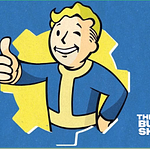Listen now on Apple, Spotify or YouTube
In This Edition
- Why we need to make more story games
- Gen X vs Gen Z
- The importance of soft skills…
- … and defined job roles!
Hello!
We’re at the two-month point in The Game Business story, and it’s been non-stop, exhausting and brilliant.
Tariffs, a new console reveal, the Minecraft movie, more tariffs, the GTA delay, console price rises, game price rises, Apple/Epic courtroom drama, shifts in the game media and a whole load of great, successful video game launches.
I have to say, I am dreading the first quiet week. And maybe this is that week. It was going to happen eventually. What will be in this Thursday’s newsletter? At the time of typing this, I am not sure.
Of course, it’s not going to stay quiet. Next week kicks off with Epic’s State of Unreal address. Then there’s the small matter of a major new console launch in Switch 2. Followed by a plethora of video game announcements as part of the 2025 Summer Game Fest.
And then the week after, we’re going to be live in Los Angeles speaking to Netflix, Twitch, Blizzard, Hasbro and a whole lot more besides (which you are free to come along to, by the way. Just apply through here).
You know what, maybe I could do with a drama-free week.
Anyway, to kick off this maybe (but probably not) quiet week, we spoke to Lisa Opie, the former TV veteran who now leads Ubisoft’s Reflections studio. During our chat, we discuss managing teams, skill shortages, and why a focus on storytelling could help combat the industry’s obsession with retention.
Listen, or watch, the full interview above, or our carefully selected highlights below.
Enjoy!
“The battle to retain people has to be countered by innovation”
Lisa Opie must be experiencing quite the whiplash.
In 2021, she left her glittering clear in television, including leading production at BBC Studios, to take on the world of video games at Ubisoft Reflections in the UK. At the time the game industry was enjoying significant growth. Studios were expanding, acquisitions were dominating the headlines and the numbers were going up and up and up.
Opie had her feet under the desk barely six months before the narrative shifted. Studios were shrinking, layoffs were dominating the headlines and the numbers were going down and down and down.
“This was an enormous learning curve for me,” she told us. “Best thing I've ever done, actually, and absolutely fascinating. Fortunately, I'm very curious, I’m nosey, so that helped.”
We’ve all had to navigate this reality, of course. But Opie had to lead teams through all this while getting to know an industry that was, to her surprise, quite different to the one she’d left behind.
“That battle to retain people has to be countered by innovation. And some of that will be innovation in storytelling.”
In our interview, she explained that TV shows have been largely made in the same way for decades, whereas in games that’s changing constantly. The artform itself is also notably different, particularly in terms of narrative. In TV, story is king, whereas in games that’s not the case.
“The fundamental structure of a television program hasn't much changed over the decades,” she told us. “There has been innovation from a technology perspective, but most of the innovation is in the storytelling. So I arrived [in games] with a focus on narrative that went beyond what I saw around me.
“The games that I played, The Last of Us Part 2, completely blew me away from a narrative perspective. I thought it was such brilliant storytelling. But I had to get my head around the fact that it's not the most important thing. It is one of them. But if you don't have a fantastically compelling core loop, it really doesn't matter how good your story is. People won't stay, won't play, won't be retained.”
Although Opie has learned that gameplay comes first, she still feels strongly in the power of storytelling. She talked about the huge live-service games that dominate player time. And the way to overcome that, she feels, is with the opposite approach.
“I know you’re going to say I am bound to say this given my background, but I still think there’s an opportunity for us to tell extraordinary and immersive stories,” she said. “I think you'll see greater breadth, and the games will become more distinctive, more diverse, more potentially accessible than that they are at the moment. And I mean accessible from a time commitment perspective. So shorter, rich experiences. That battle to retain people has to be countered by innovation. And some of that will be innovation in storytelling.”
Here are five other key takeaways from our interview with Ubisoft Reflections Managing Director Lisa Opie.
1. Workers are starting to understand the commercial realities of video games
This year, one of Lisa Opie’s studios, Ubisoft Leamington, closed down. It had been working on big titles including The Division and Star Wars Outlaws. There were also job losses at Opie’s Reflections studio in Newcastle, too.
Opie didn’t address those situations directly, but believes it’s important that employees have an understanding of the financial realities of making video games.
“We are going through a period of having to adjust to the market around us,” she said. “A few years ago, we wouldn't have focused on that sector of casual gamers who may actually just be hooked into 10 episodes of White Lotus or whatever on Netflix, and therefore don’t buy that next game because they are time poor. Now we are quite mature, those situations impact whether a game is successful or not.
“We're making decisions because the whole sector is shifting around us and we need to change. It's difficult, it's challenging, but that is the reality.”
“There’s a maturity that we need to find within our workforce and within our approach and within our sector and business that enables us to adjust to those market shifts.
“In commercial television and TV production, you sit quite close to the commercial road. Because you can make a lot more programs in one time, you deliver in a much tighter time scale, and you have a much more open market to go and sell your programs into. Therefore, you are really commercially aware. You feel if there is less commissioning happening from one broadcaster or one streamer. And in the TV sector at the moment, it's a really challenging time.
“In the game sector where there's a much less flexible workforce, plus video games take quite a long time to make, you can have a cushioning. I think what you can see at the moment is people waking up to the fact that there are commercial challenges within our sector that are driving what is happening. These aren't personal decisions we're making. We're making decisions because the whole sector is shifting around us and we need to change. It's difficult, it's challenging, but that is the reality. At the end of the day, we have to be driven by the players who buy our games.”
2. Getting Gen Z and Gen X to work together is a positive challenge
Lisa Opie spoke at an event I ran last year around managing staff from different generations, who each have radically different expectations of their employers and colleagues. And she actually feels that the differences provide opportunity.
“One of the big benefits of having a workforce that stretches increasingly from Gen Z through to baby boomers… all of them bring different skills,” Opie explained.
“The positives that Gen Zs bring is huge amounts of focus on authenticity. A demand for respect, which I think is really valuable, and a need to understand purpose fundamentally. Whereas as you look at Gen X for example, they prefer much more rigid frameworks around them. They like a clear objective. They don't mind coming into the office. They don't mind being there five days a week. It's absolutely fine. They're probably less inclined to take a view about purpose and authenticity and respect. Not that they don't care about those things, but it may not be as front of mind.
“For all of us as organizations, we are trying to manage a really diverse sector of people from all different age groups, working out how they work well together and how do you make the most of them collectively? It is a really interesting challenge and a really positive one.”
3. We really need to teach our staff soft skills
The Workforce Institute did a research project where they interviewed 3,000 Gen Zs in different countries, and asked them about their readiness for work. 51% felt that university education didn’t equip them to enter the workplace. One in four of them felt they would have challenges negotiating with people, including sharing their opinions or having difficult conversations. Meanwhile, one in five felt they would find it challenging being managed by somebody or managing somebody in a conversation.
“And quite a lot of them expressed concern about being asked to contribute beyond the average working day,” Opie added. “That's really interesting. When I look at the skills that people bring to work, I think we as an industry underestimate some of those soft skills that people need within the workplace. We talk a lot about the hard skills that we've got or don't have. But you hear less about some of those soft skills.”
“Quite a lot of [Gen Z] expressed concerns about being asked to contribute beyond the average working day”
She added: “The ability to work as part of a team and to be able to take feedback or give feedback, all of those kinds of things… it’s increasingly important that universities offer that up. We take a lot of effort in our studios at Ubisoft to invest in training for teams to give them the skills that they need. We run leadership courses that have been properly accredited and we run mentoring schemes.”
4. Defined job roles can help solve our skill gap problem
One of the elements in developing skills, whether those are hard or soft skills, is the need for the industry to collectively start defining roles.
In video games, two people at two different companies with the same job title might have entirely different skillsets and responsibilities, and that makes it hard when trying to develop talent collectively as an industry.
“We don't necessarily work as collectively as we could,” Opie said. “In TV, 70% of the workforce move from production company to production company, and therefore there are really defined job roles out there that people can immediately identify. Everybody knows that a researcher at one production company does pretty much the same as a researcher at another. That isn't the case within games. People tend to stay within the same organization and don't necessarily move around. And as a result, we have some work to do on aligning where those gaps currently lie and how we are all going to fill them collectively.”
5. Working together in a physical space will remain part of the future
At the end of our chat, we discussed the future of game studios. And one of the things that Opie feels is part of that future are teams working together in the same space.
“We are in the process of bringing people back into our studios within Reflections in Newcastle”
“We have quite a few people who now work remotely and then we are in the process of bringing people back into our studios within Reflections in Newcastle,” she said.
“It's actually really brilliant to be working with people in a physical space. It's inordinately exciting. We've had a policy where people have come back into the office, and lots have, but we've put quite a bit of energy and effort into making sure that our space is organized to be as creative as possible. I do think the power of connecting with people will remain really, really strong.”
Thank you for reading this week! We’ll be back later in the week with another Newsletter. Until then, thank you for reading.













